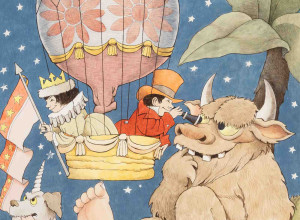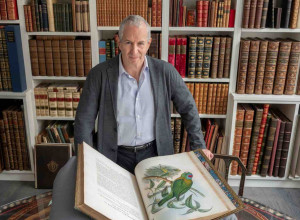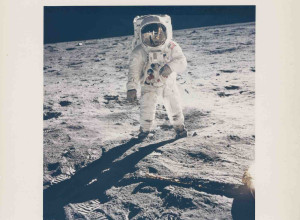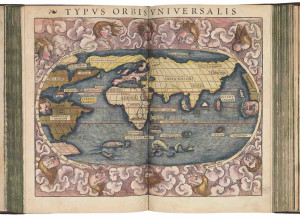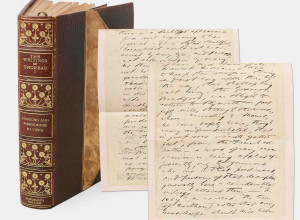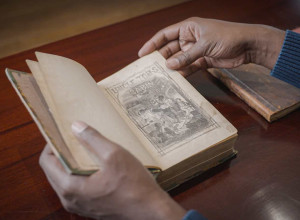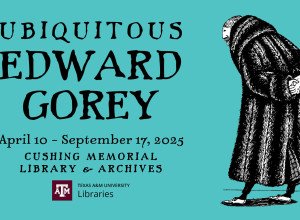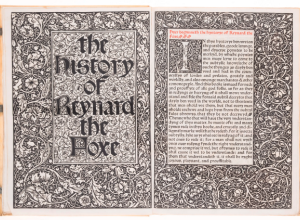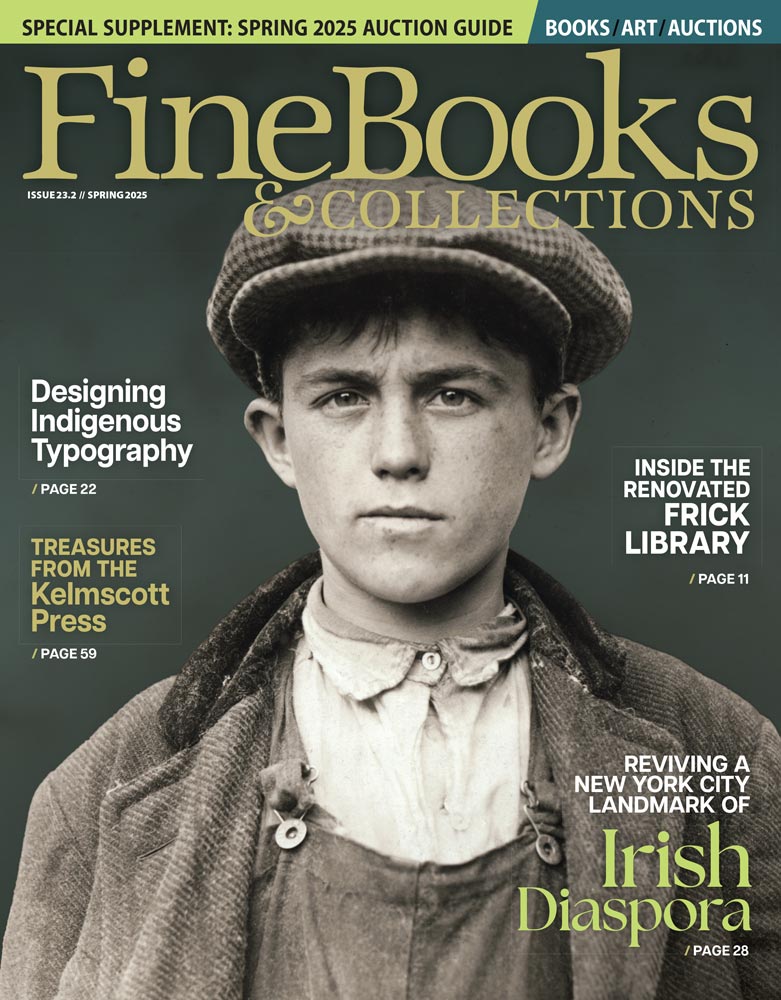Bright Young Things: Dan Whitmore
Our series profiling the next generation of antiquarian booksellers continues today with Dan Whitmore, proprietor of Whitmore Rare Books in Pasadena, California:
 NP: How did you get started in rare books?
NP: How did you get started in rare books?
DW: I am a reader. I loved reading literature from an early age and realized during college, that I didn't have the time to read all the books that I wanted to. As a result, I focused on the classics, although from several different genres: Russian, Victorian, Modern, Children's, etc. While attending law school in Philadelphia, I stumbled upon a first edition of "For Whom the Bell Tolls" and I was hooked. My pursuit of modern firsts quickly outgrew the shops in Philadelphia and I had to venture further afield. I found Royal Books in Baltimore and was very impressed. The owner, Kevin Johnson, took the time to guide me in collecting and, later, would act as a mentor for me when I launched my own company.
NP: When did you open Whitmore Rare Books?
DW: My transition from collector into dealer was relatively rapid. I sold my first book in April of 2009 and then proceeded to sell on consignment for the remainder of the year. With much encouragement and support from my lovely wife, I gave notice about six months from my first book sale and was ready to sell under our own banner in early 2010.
 NP: How did you get started in rare books?
NP: How did you get started in rare books?DW: I am a reader. I loved reading literature from an early age and realized during college, that I didn't have the time to read all the books that I wanted to. As a result, I focused on the classics, although from several different genres: Russian, Victorian, Modern, Children's, etc. While attending law school in Philadelphia, I stumbled upon a first edition of "For Whom the Bell Tolls" and I was hooked. My pursuit of modern firsts quickly outgrew the shops in Philadelphia and I had to venture further afield. I found Royal Books in Baltimore and was very impressed. The owner, Kevin Johnson, took the time to guide me in collecting and, later, would act as a mentor for me when I launched my own company.
NP: When did you open Whitmore Rare Books?
DW: My transition from collector into dealer was relatively rapid. I sold my first book in April of 2009 and then proceeded to sell on consignment for the remainder of the year. With much encouragement and support from my lovely wife, I gave notice about six months from my first book sale and was ready to sell under our own banner in early 2010.
NP: What does WRB specialize in?
DW: We offer literary first editions and other books of merit. This is intentionally vague to allow us the flexibility to offer a variety of interesting and rare books. The basis of our inventory when we started was heavily modern, due to my collecting focus at the time. We still handle modern firsts, but I have become more selective when it comes to purchasing new inventory and I find that my areas of interest are constantly expanding. I expect that our inventory will continue to grow and change as we learn about different fields of the rare book trade and come to appreciate the subtleties and interest of those areas.
NP: What do you love about the rare book trade?
DW: I love how each book or document that we handle has its own story to tell. Through researching, collating and describing a book, we gain insights into the life of the author, the flavor of the time, the publication process, etc. We handled a relatively dry commission from King James I and VI, but discovered a whole subtext of meaning for Francis Bacon, based on the document being dated during his corruption trail and subsequent exile from court.
NP: Favorite or most interesting book you've handled?
DW: "Don Quixote." My first significant purchase was the 1620 Thomas Shelton translation of "Don Quixote." This was the first edition in English of part 2 and a corresponding reprint of part 1 (originally published in 1612). I love the story of "Don Quixote," I love the humor, the tragedy, and how vibrant it remains after 400 years. It was about 300 years older than anything else that I had handled and it opened up the joys and difficulties of the antiquarian book trade to me. I ran the book over to the Huntington Library, to compare it with their copy. I reached out to various binderies to find someone good to work on the book. I researched the book and tried my hand at writing a description (it wasn't easy). Letting go of the book was difficult, a part of me wanted to keep it, but the dealer instinct kicked in and we made the sale.
NP: What do you personally collect?
DW: I collect things written by friends, books inscribed to me, and books that people gave to me as gifts, even if they are not firsts. Most of the books in my inventory are books that I would love to collect and maybe one day I will build a library for myself. For now, the really exciting books will go off to new homes.
NP: Any thoughts on the future of the book trade?
DW: The future of the book trade is attracting new dealers and new collectors. Most collectors have a life-cycle made up of an active phase where they acquire their books, an inactive phase where those books sit and then a de-acquisition phase where those books either go to a library, or come back on the market. Without an influx of new dealers and new collectors, the book trade cannot last. I am encouraged to see young collectors on the floors of most book fairs and young dealers, like myself, learning the trade. Finding ways to encourage entry into this world is key. At some point, I would like to see collective marketing efforts among booksellers or other concerted activities to promote rare books generally.
NP: Tell us about assembling your catalogue and how to get a copy:
DW: My wife is a talented photographer and graphic designer. After I select the books, she runs the catalogue process from start to finish. We really enjoyed working on this latest catalogue and are proud of the result. It features an eclectic group of books, heavy with Dickens, some children's literature, a few early scholarly works, and others. Copies are available in either electronic or paper format, simply indicate your preference and provide us appropriate contact information and we would be happy to include you on our mailing list.
DW: We offer literary first editions and other books of merit. This is intentionally vague to allow us the flexibility to offer a variety of interesting and rare books. The basis of our inventory when we started was heavily modern, due to my collecting focus at the time. We still handle modern firsts, but I have become more selective when it comes to purchasing new inventory and I find that my areas of interest are constantly expanding. I expect that our inventory will continue to grow and change as we learn about different fields of the rare book trade and come to appreciate the subtleties and interest of those areas.
NP: What do you love about the rare book trade?
DW: I love how each book or document that we handle has its own story to tell. Through researching, collating and describing a book, we gain insights into the life of the author, the flavor of the time, the publication process, etc. We handled a relatively dry commission from King James I and VI, but discovered a whole subtext of meaning for Francis Bacon, based on the document being dated during his corruption trail and subsequent exile from court.
NP: Favorite or most interesting book you've handled?
DW: "Don Quixote." My first significant purchase was the 1620 Thomas Shelton translation of "Don Quixote." This was the first edition in English of part 2 and a corresponding reprint of part 1 (originally published in 1612). I love the story of "Don Quixote," I love the humor, the tragedy, and how vibrant it remains after 400 years. It was about 300 years older than anything else that I had handled and it opened up the joys and difficulties of the antiquarian book trade to me. I ran the book over to the Huntington Library, to compare it with their copy. I reached out to various binderies to find someone good to work on the book. I researched the book and tried my hand at writing a description (it wasn't easy). Letting go of the book was difficult, a part of me wanted to keep it, but the dealer instinct kicked in and we made the sale.
NP: What do you personally collect?
DW: I collect things written by friends, books inscribed to me, and books that people gave to me as gifts, even if they are not firsts. Most of the books in my inventory are books that I would love to collect and maybe one day I will build a library for myself. For now, the really exciting books will go off to new homes.
NP: Any thoughts on the future of the book trade?
DW: The future of the book trade is attracting new dealers and new collectors. Most collectors have a life-cycle made up of an active phase where they acquire their books, an inactive phase where those books sit and then a de-acquisition phase where those books either go to a library, or come back on the market. Without an influx of new dealers and new collectors, the book trade cannot last. I am encouraged to see young collectors on the floors of most book fairs and young dealers, like myself, learning the trade. Finding ways to encourage entry into this world is key. At some point, I would like to see collective marketing efforts among booksellers or other concerted activities to promote rare books generally.
NP: Tell us about assembling your catalogue and how to get a copy:
DW: My wife is a talented photographer and graphic designer. After I select the books, she runs the catalogue process from start to finish. We really enjoyed working on this latest catalogue and are proud of the result. It features an eclectic group of books, heavy with Dickens, some children's literature, a few early scholarly works, and others. Copies are available in either electronic or paper format, simply indicate your preference and provide us appropriate contact information and we would be happy to include you on our mailing list.





